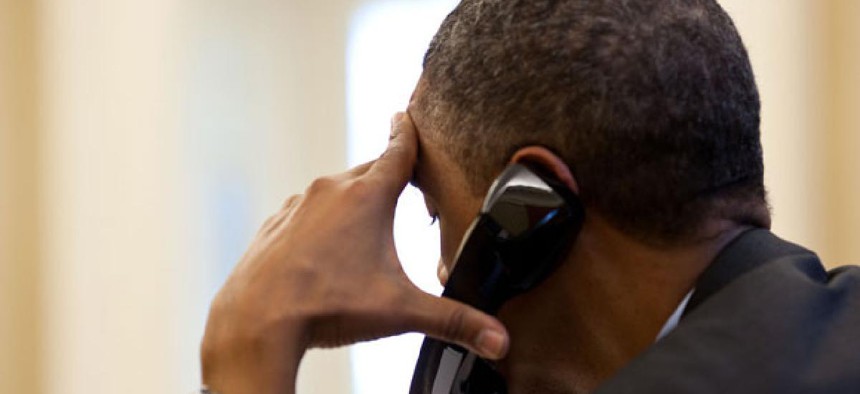
Pete Souza/White House
President Obama's reelection effort isn't the toughest, or most aggressive, in American history.
It only looks and feels that way compared with the gauzy memories most have of the lilt, sunshine, and post-partisan pixie dust of 2008.
Never mind that Obama was tough in the clutch during his primary cage match with then-Sen. Hillary Rodham Clinton, and unstinting in his criticism of John McCain as a heroic but nevertheless remanufactured jalopy off the George W. Bush assembly line.
Obama did trade in 2008 on aspirations of a political world without petty partisan differences, "tit-for-tat" haggling over wedge issues, or real or imagined flip-flops. Now it often feels as if Obama's reelection talking points strain to rise to tit-for-tat seriousness. What they undoubtedly lack, according to senior advisers to GOP candidate Mitt Romney, is a conviction that limits exist and that the brutal work of attempting to disqualify Romney is just that. Brutal.
Romney advisers believe that Obama's playing a dangerous game, imagining he is more likable than he is and betting that running against his 2008 brand won't discourage voters who genuinely thought Obama was and would be different.
"Obama can't run on what he's done and he can't run on what he represents anymore," said a senior Romney adviser. "Voters will see that and that gives us a chance to tell Romney's story and win."
Romney's team will devote a good part of its convention week to lamenting — for political purposes — Obama's campaign coldness and harshness (Obama even brought out the shaggy-dog line of attack about Romney's dog Seamus in Iowa last week). The first day's theme in Tampa, Fla., "We Can Do Better," is all-inclusive. Political tone is part of it. Romney's convention stage managers will use all the tools of sets and lighting and presentation to create an atmosphere of warmth and accessibility — a visual and tonal attempt to contrast Romney with Obama's penchant for punching and counterpunching. This is Romney's last chance to create some kind of glow; last week's scorn over Obam's harshness — and the ensuing debate over its sincerity — was a tactical prelude to Tampa.
Democrats laud Team Obama's tenacity, in part because they want to protect the hard-won gains of his first two years. They want a harshly protective president to defend health care, bank regulations, and green-energy investments, not to mention education spending, Medicaid, Medicare, and environmental regulations. Discouraging words about the combative Obama — former Alabama Democratic Rep. Artur Davis notwithstanding — are rare.
Obama's campaign didn't flinch or even fake a wince when Vice President Joe Biden said that Romney's desire to undo Obama's raft of new Wall Street regulations would put Americans "back in chains." That Biden said it in a Southern drawl he kept conspicuously under wraps during 30-plus years in the Senate and two presidential campaigns mattered not at all — or that it was said in Danville, Va., a city with a deep history of racial scars arising out of civil-rights protests, arrests, and police violence. All this racially layered context evaporated, Obama's team said, next to Biden's underlying point about the evils of any attempt to eradicate the Dodd-Frank regulations of big banks.
Romney called Biden's remarks consistent with a reelection campaign based on "anger" and "hatred." Team Obama shrugged, knowing that in a battle defined by consistently underwhelming economic news and unmet promises on deficit reduction, job creation, and wage growth, the deficiencies of Romney must appear more threatening or displeasing than the realities of Obama's first term.
Obama advisers readily admit they have spent the summer trying to cut the ground out from under Romney by making him appear secretive and heartless. Not just someone who is wealthy, but who has a bullying side. It's the Romney project.
That's the underlying message behind the attacks on Bain Capital, Romney's private-equity firm, and the endless fascination team Obama has in Romney's tax returns. After implying Romney might have committed a felony in the filing of a form to the Securities and Exchange Commission, the Obama team then subcontracted to Senate Majority Leader Harry Reid of Nevada the task of smoking out Romney on taxes.
In 2008, it would have been hard to fathom an Obama campaign standing alongside a surrogate who alleged a rival candidate paid no income taxes — an allegation based on anonymous, uncorroborated hearsay evidence.
"This whole thing with Harry is absurd when you think about it," Obama senior adviser David Axelrod toldNational Journal, referring to Romney's reaction, not Reid's charge. "Because he (Romney) could end this whole discussion in 10 minutes. He could come and say ‘Here they are, here’s my last 10 years of tax returns. Here’s my last 23 I gave to John McCain and as you can see I paid taxes every year, net taxes every year. SoHarry Reid you’re a f****** liar. Easy."
Obama's campaign last week dialed its request for tax records back to five years, which Romney summarily ignored. But Reid's tenacity and audacity (a different kind than Obama wrote about) kept the issue alive and forced it into a Romney question-and-answer session. That's where Romney said he's paid no less than a 13 percent effective federal tax rate over the past 10 years.
This was vindication of Obama's hardball tactics. They forced Romney to reveal more than he intended. An outlandish charge with no foundation nevertheless drew blood and made news. This, Obama's team believes, is what must be done to win. It marvels at what it calls Romney's unwitting complicity.
"He’s been very collaborative in this project by being so furtive and so secretive on so many things," Axelrod said. "He’s contributed to his own problem by failing to lay down a foundation. Whether it’s that he didn’t pay taxes or whether he paid a very low rate or whether he took advantage of some dubious loopholes, I just don’t know what it is. We are not painting a picture of something that isn’t there."
Additionally, Obama's team knows it's been taking flak for months from Romney's allies in the super PAC community and makes no apologies for hitting back with a vengeance at Romney, whom many Obama senior advisers believe weeps crocodile tears over campaign rhetoric while leaving the toughest attacks to super PAC allies. While it's true Obama has spent more head-to-head than Romney ($85.3 million to $50.3 million, largely because Romney can only spend general election donations after the convention), the pro-Romney and pro-GOP super PACS have tilted overall spending in Romney's favor ($168.5 million for Romney to $102.7 million for Obama, according to the Campaign Media Analysis Group).
"Campaign to campaign (spending) doesn't mean s***," Axelrod said. "What matters is gross spending. I said a long time ago that they've contracted their hits out to contract hit men."
Obama's campaign also believes its intense swing-state focus on abortion and contraception issues has been given new and possibly crippling heft with Rep. Todd Akin's comments about "legitimate rape" as he seeks to unseat Democratic Sen. Claire McCaskill in Missouri. The Romney campaign swiftly distanced itself from Akin, but Romney's running mate, Wisconsin Rep. Paul Ryan, cosponsored legislation with Akin that unsuccessfully sought to redefine "forcible rape" in the federal code. Tough commercials on this are in the works as are radio ads in swing states battering Romney and Ryan for domestic spending cuts in Ryan's GOP budget blueprints.
Obama's team trafficked in sweetness and light in 2008, or so it seemed. That was the opportunistic play. It contrasted helpfully with the allegedly dark political arts of the Clintons and Bush's unpopular performance as a warrior president presiding over an economic meltdown. Optimism is fool's gold now and no longer the opportunist's path. Disqualification is the coin of the realm. And Obama's team is buying.







